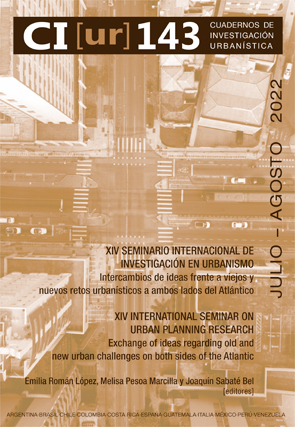Desarrollo de la gobernanza urbana resiliente al cambio climático en Bangladesh. Evaluación de la vulnerabilidad del impacto del cambio climático en ciudades intermedias y comprensión de la gobernanza local = Developing climate change resilient urban governance in Bangladesh. Vulneribility Assesment of Climate Change Impact in Intermediate Cities and Understanding Local Governance
DOI:
https://doi.org/10.20868/ciur.2022.143.5001Palabras clave:
Climate change, urban governance, climate resilience, intermediate citiesResumen
Abstract
In this study five intermediate cities of Bangladesh as future populated urban centers have been investigated to formulate a comprehensive framework for climate resilient urban governance The conceptual framework adopted the modified structure of CRF model of S Tyler and M Moench (2012) incorporating Urban functional system, Local urban governance, and Climate resilience as major components. The cities have been conceptualized as a functional system to identify the climate change impact upon social, economic, environmental and political subsystems. The vulnerability assessment of climate change impact shows that the different level of risks caused by frequent climate hazards. The research initiates a resilience building process based on Mehta’s good governance (1998) through a shared learning dialogue (SLD) among stakeholders.
Descargas
Referencias
Akter, T. et al. (2015). Climate Change impact on Agriculture and Food security of Barishal District. International conference on Climate Change in relation to Water and Environment (I3CWE-2015). Department of Civil Engineering. DUET - Gazipur, Bangladesh
Asian Cities Climate Change Resilience Network (ACCCRN): Responding to the Urban Climate Challenge. Eds. ISET, Boulder, Colorado, USA, 60 pp. ISBN: 978-0-9843616- 0-1
Chakrvaorti, BK. (2018). Thunderstorm and Lightning: The Temperature Effect on Climate Change of Rangpur Region in Bangladesh. Science Journal of Energy Engineering DOI: 10.11648/j.sjee.20180602.11
Ericksen, N.J., Ahmad, Q.K. and Chowdhury, A.R., 1993. Socio-Economic Implications of Climate Change for Bangladesh. Briefing Document No. 4. ISBN 984-8126-03-1, Bangladesh Unnayan Parishad (BUP), Dhanmondi, Dhaka-1205, Bangladesh. DOI: 10.1007/978-94-009-0241-1_5
Ferdous, M. G. and Baten M. A. 2011, Climatic Variables of 50 Years and their Trends over Rajshahi and Rangpur Division, Journal of Environmental Science & Natural Resources, 4(2), pp. 147-150. DOI:10.3329/jesnr.v4i2.10165
Fernandez-Guell J.M. et. al. (2016): Incorporating a Systemic and Foresight Approach into Smart City Initiatives: The Case of Spanish Cities. Journal of Urban Technology. DOI:10.1080/10630732.2016.116444.
Geag. (2009). Vulnerability Analysis – Gorakhpur City. GEAG, Gorakhpur.
Hasan, M. M. et. al. (2018). Environmental Change and Its Impacts on Lives and Livelihoods of South-Central Coastal Districts of Bangladesh. American Journal of Biological and Environmental Statistics. 4(2). 42-48. doi: 10.11648/j.ajbes.20180402.11
Islam, N. (2015). Urbanization and Urban Poverty in Bangladesh: Issues in Disparities, Deprivations and Rights. Barrister Syed Ishtiaq Ahmed Memorial Lecture 2015. Dhaka: Asiatic Society of Bangladesh. ISBN-13 : 978-9843475381
Karim, R. et. al. (2013). Impacts of Climate Change on Socio-Economic Sector and Health profile in the interior Coast, Bangladesh: the Case Study of Dumuria Upazilla, Khulna, Bangladesh. IOSR Journal Of Environmental Science, Toxicology And Food Technology (IOSR-JESTFT). 5(1). 38-46. e-ISSN: 2319-2402,p- ISSN: 2319-2399. https://www.iosrjournals.org/
Mehta, D. (1998) Urban Governance: Lessons from Best Practice in Asia, UMPAsia Occasional Paper 40, Pathumthani, Thailand: UN-HABITAT Urban Management Programme. OCLC Number / Unique Identifier:434321303, https://www.worldcat.org/
Mehrotra, S., Natenzon, C. E., Omojola, A., Folorunsho, R., Gilbride, J., & Rosenzweig, C. (2009, June). Framework for city climate risk assessment. In Fifth Urban Research Symposium, Marseille, France (pp. 28-30). Retrived from https://www.academia.edu/68165903/Framework_for_City_Climate_Risk_Assessment
Opitz-Stapleton, S. et. al. (2009). ACCCRN: Responding to the urban climate challenge. ISBN: 978-0-9843616-0-1.
Panday, P. K. (2006). Problems of urban governance in Bangladesh. New Delhi: Serials Publication. ISBN:9788183872164
Panday, P.K. (2007). Policy Implementation in Urban Bangladesh: Role of Intraorganizational Coordination. Public Organization Review. 7. 237–259. DOI: 10.1007/s11115-007-0034-3
Rosenzweig, C., & Hillel, D. (2008). Climate Variability and the Global Harvest: Impact of El Niño and Other Oscillations on Agro‐Ecosystems. New York: Oxford University Press. https://doi.org/10.2135/cropsci2008.05.0004br
Sarwar GM, Khan MH (2007) Sea level rise: a threat to the coast of Bangladesh. Int Forum Int Q Asian Stud 38(3/4):375–397. DOI: https://doi.org/10.11588/iaf.2007.38.329
Shamsuddoha, M. and Chowdhury, R. K. (2007). Climate Change Impact and Disaster Vulnerabilities in the Coastal Areas of Bangladesh, COAST Trust and Equity and Justice Working Group (EJWG), Retrieved from https://www.preventionweb.net/publications/view/4032.
Tyler, S. and Moench, M. (2012). A framework for urban climate resilience, Climate and Development. Climate and Development 4(4). 311-326, DOI: 10.1080/17565529.2012.745389.
Van Der Heijden J. (2014). Governance for Urban Sustainability and Resilience: Responding to Climate Change and the Relevance of the Built Environment, Science and Public Policy 42(6).scv040. DOI:10.1093/scipol/scv040












